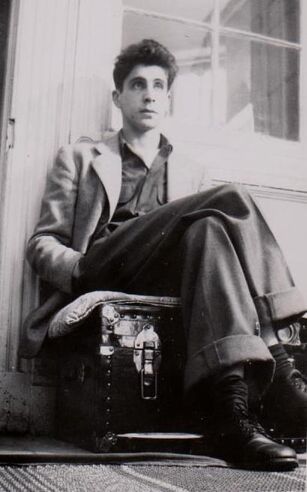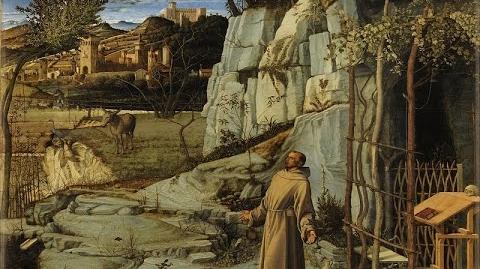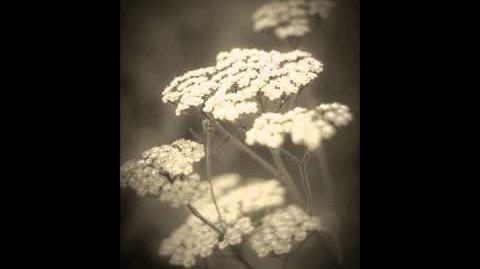
Anthony Hecht (1923-2004) at the Iowa Writers Workshop,1947. Photo by C. Cameron Macauley. Courtesy Wikimedia Commons.
Anthony Evan Hecht (January 16, 1923 - October 20, 2004) was an American poet and academic.
Life[]
Template:Refimprove
Youth[]
Hecht was born in New York City to German-Jewish parents. He was educated at various schools in the city - he was a classmate of Jack Kerouac at Horace Mann School - but showed no great academic ability, something he would later refer to as "conspicuous." However, as a freshman English student at Bard College in New York he discovered the works of Stevens, Auden, Eliot, and Dylan Thomas.[1] It was at this point that he decided he would become a poet. Hecht's parents were not happy at his plans and tried to discourage them, even getting family friend Ted Geisel (better known as Dr. Seuss) to attempt to dissuade him.
In 1944, upon completing his final year at Bard, Hecht was drafted into the 97th Infantry Division and was sent to the battlefields in Europe. He saw a great deal of combat in Germany, France, and Czechoslovakia. However, his most significant experience occurred on April 23, 1945. On this day Hecht's division helped liberate Flossenbürg concentration camp. Hecht was ordered to interview French prisoners in the hope of gathering evidence on the camp's commanders. Years later, Hecht said of this experience,
- The place, the suffering, the prisoners' accounts were beyond comprehension. For years after I would wake shrieking.[1]
Career[]
After the war ended, Hecht took advantage of the G.I. bill to study under poet-critic John Crowe Ransom at Kenyon College, Ohio. Here he came into contact with fellow poets such as Randall Jarrell, Elizabeth Bishop, and Allen Tate. He later earned a master's degree from Columbia University. In 1947-1948 Hecht attended the University of Iowa and taught in the Iowa Writers' Workshop, together with poet Robert Lowell and writer Robie Macauley, with whom Hecht had served during WWII,[2] but, suffering from post-traumatic stress disorder after his war service, gave it up swiftly to enter psychoanalysis.[3]
Hecht became friends with W.H. Auden in 1951 during a holiday on the Italian island of Ischia, where Auden spent each summer. In 1993 Hecht would publish The Hidden Law, a critical reading of Auden's body of work.
Hecht released his 1st collection, A Summoning of Stones, in 1954.I
In his next work, The Hard Hours, Hecht 1st addressed his own experiences of World War II - memories that had caused him to have a nervous breakdown in 1959.[4] Hecht spent 3 months in hospital following his breakdown, although he was spared electric shock therapy (unlike Sylvia Plath, whom he had met while teaching at Smith College).
Hecht's main source of income was as a teacher of poetry, most notably at the University of Rochester where he taught from 1967 to 1985. He also spent varying lengths of time teaching at other notable institutions such as Smith, Bard, Harvard, Georgetown, and Yale.[5]
Hecht died October 20, 2004, at his home in Washington, D. C.;[6] he is buried at the cemetery at Bard College.
Writing[]
Hecht's poetry combined a deep interest in form with a passionate desire to confront the horrors of 20th century history, with World War II (in which he fought) and the Holocaust being recurrent themes in his work.[6]
In Hecht's debut collection, A Summoning of Stones, his mastery of a wide range of poetic forms were clear as was his awareness of the forces of history, which he had seen first hand. Even at this stage Hecht's poetry was often compared with that of W.H. Auden.
In his next work, The Hard Hours, Hecht 1st addressed his own experiences of World War II - memories that had caused him to have a nervous breakdown in 1959.[4]
Double Dactyl[]
- Main article: Double dactyl
Hecht is one of the inventors of the double dactyl, a form of light verse. In his weekly on-line chat on January 22, 2008, Gene Weingarten of the Washington Post wrote a double dactyl to honor Hecht:
- Higgledy Piggledy
- Anthony Hecht, who could
- Write about death in words
- Epic yet warm,
- Went to his own with some
- Counterintuitive
- Logic; his legacy's
- This stupid form.
Recognition[]
Between 1982 and 1984, Hecht held the esteemed position of Poet Laureate Consultant in Poetry to the Library of Congress. He won a number of notable literary awards including: the Prix de Rome in 1951; the 1968 Pulitzer Prize in Poetry for his 2nd collection, The Hard Hours; the 1983 Bollingen Prize; the 1988 Ruth Lilly Poetry Prize; the 1997 Wallace Stevens Award, the 1999/2000 Frost Medal, and the Tanning Prize.[7]
On November 17, 2004, Hecht was posthumously awarded the National Medal of Arts, accepted on his behalf by his wife, Helen Hecht.[8]
The Anthony Hecht prize is awarded annually by the Waywiser press.[4]
Publications[]
Poetry[]
- A Summoning of Stones. New York: Macmillan, 1954.
- The Seven Deadly Sins (pamphlet; includes wood engravings by Leonard Baskin). Rockport, ME: Gehenna Press, 1958.
- Struwwelpeter, a Poem. Rockport, ME: Gehenna Press, 1958.
- The Hard Hours. New York: Atheneum, 1967.
- Aesopic (couplets; includes wood engravings by Thomas Bewick) Rockport, ME: Gehenna Press, 1968.
- Millions of Strange Shadows. New York: Atheneum, 1977.
- The Venetian Vespers. New York: Atheneum, 1979.
- A Love for Four Voices: Homage to Franz Joseph Haydn. Hitchin, Hertfordshire, UK: Mandeville, 1983.
- The Transparent Man. New York: Knopf, 1990.
- Collected Earlier Poems (contains The Hard Hours, Millions of Strange Shadows, and The Venetian Vespers). New York: Knopf, 1990.
- Death Sauntering About. Amherst, MA: Friends of the Amherst College Library, 1994.
- The Presumptions of Death. Rockport, ME: Gehenna Press, 1995.
- Flight Among the Tombs: Poems. New York: Knopf, 1996.
- The Gehenna Florilegium. Rockport, ME: Gehenna Press, 1998.
- The Darkness and the Light. New York: Knopf, 2001.
- Collected Later Poems. New York: Knopf, 2005.
Non-fiction[]
- Robert Lowell: A lecture delivered at the Library of Congress on May 2, 1983. Washington, DC: Library of Congress, 1983.
- The Pathetic Fallacy: A lecture delivered at the Library of Congress on May 7, 1984Washington, DC: Library of Congress, 1985.
- Obbligati: Essays in Criticism. New York: Atheneum, 1986.
- The Hidden Law: The Poetry of W.H. Auden. Cambridge, MA: Harvard University Press, 1993.
- On the Laws of the Poetic Art. Princeton, NJ: Princeton University Press, 1995.
- Anthony Hecht: In conversation with Philip Hoy (with Philip Hoy). London: Between the Lines, 1999.
- Melodies Unheard: Essays on the mysteries of poetry. Baltimore, MD: Johns Hopkins University Press, 2003.
Translated[]
- Aeschylus, Seven against Thebes (Translated with Helen Bacon). New York: Oxford University Press, 1973.
Edited[]
- Jiggery-Pokery: A compendium of double dactyls (with John Hollander). New York: Atheneum, 1967.
- The Essential Herbert. New York: Ecco, , 1987.
- William Shakespeare, The Sonnets (with G. Blakemore Evans). New York: Cambridge University Press, 1996.
Except where noted, bibliographical information courtesy the Poetry Foundation.[9]

At the Frick - Anthony Hecht
Audio / video[]

Behold The Lillies Of The Field, a poem by Anthony Hecht
- Anthony Hecht: Reading from his poetry (tape). Washingron, DC: Library of Congress, 1983.
- Anthony Hecht (2 casettes). Kansas City, MO: University of Missouri, 1985.
- Melodies Unheard: Essays on the mysteries of poetry (CD). Princeton, NJ: Recordings for the Blind and Dyslexic, 2003.
- Anthony Hecht. New York: Academy of American Poets, 2004.
Except where noted, discographical information courtesy WorldCat.[10]
See also[]
| ||||||||
References[]
- ↑ 1.0 1.1 Matt Schudel (October 22, 2004). "Poet, Essayist Anthony Hecht Dies at 81". Washington Post. http://www.washingtonpost.com/wp-dyn/articles/A53133-2004Oct21.html.
- ↑ Kennedy, Thomas E., "A Last Conversation with Robie Macauley," Agnii, Vol. 45, 1997.
- ↑ Anthony Hecht, obituary
- ↑ 4.0 4.1 4.2 http://waywiser-press.com/hechtprize.html
- ↑ "Anthony Hecht". The Daily Telegraph (London). October 25, 2004. http://www.telegraph.co.uk/news/obituaries/1474996/Anthony-Hecht.html.
- ↑ 6.0 6.1 Shapiro, Harvey (October 22, 2004). "Anthony Hecht, a Formalist Poet, Dies at 81". The New York Times. http://www.nytimes.com/2004/10/22/books/22Hecht.html.
- ↑ Elizabeth A. Brennan, Elizabeth C. Clarage, ed (1999). Who's who of Pulitzer Prize winners. Greenwood Publishing Group. ISBN 9781573561112. http://books.google.com/books?id=63nvmt4HqTEC&pg=PA533&lpg=PA533&dq=Anthony+Hecht+iowa&source=bl&ots=VnsnS0mdGe&sig=-LgdqrqBtPOfhC6DaRRQblaHjjY&hl=en&ei=wdfNTNHCMMT7lwfjp7nlCA&sa=X&oi=book_result&ct=result&resnum=4&ved=0CCEQ6AEwAzgK#v=onepage&q=Anthony%20Hecht%20iowa&f=false.
- ↑ National Endowment for the Arts - 2004 National Medal of Arts
- ↑ Anthony Hecht 1923-2004, Poetry Foundation, Web, June 26 2012.
- ↑ Search results = au:Anthony Hecht, WorldCat, OCLC Online Computer Library Center Inc. Web, May 12, 2018.
External links[]
- Poems
- Anthony Hecht profile & 3 poems at the Academy of American Poets.
- Anthony Hecht at Caladesishore (5 poems)
- Anthony Hecht 1923-2004 at the Poetry Foundation.
- Anthony Hecht - Online Poems.
- Anthony Evan Hecht at PoemHunter (31 poems).
- Anthony Hecht at AllPoetry (33 poems)
- Audio / video
- Books
- Anthony Hecht at Amazon.com
- About
- "Poet, essayist Anthony Hecht dies at 81, Washington Post
- Anthony Hecht obituary at The Guardian
- Anthony Hecht at NNDB.
- J.D. McClatchy (Fall 1988). "Anthony Hecht, The Art of Poetry No. 40". The Paris Review. http://www.theparisreview.org/interviews/2487/the-art-of-poetry-no-40-anthony-hecht.
- Anthony Hecht (1923-2004) at Modern American Poetry.
- "The Shorter Poems of Anthony Hecht" by Jan Schreiber (.PDF)
- Etc.
| This page uses Creative Commons Licensed content from Wikipedia. (view article). (view authors). |
| This page uses content from Wikinfo . The original article was at Wikinfo:Anthony Hecht. The list of authors can be seen in the (view authors). page history. The text of this Wikinfo article is available under the GNU Free Documentation License and the Creative Commons Attribution-Share Alike 3.0 license. |
|